This year we spent our summer holiday in Greece. From my point of view, it could have been any country with sun and sea and more than 25 degrees, given that we had another horrible summer here in England. For Georgi however, the choice had more emotional weight. She had just finished reading “Captain Corelli’s Mandolin” earlier this year when she solemnly announced: “This year we’re going to Greece”.
So we spoke with a few Greek friends, asked around, surfed the web a bit and even bought a travel book (which I sadly lost in Santorini, towards the end of our trip). We decided that it would be best to have a bit of freedom, so in true personal style we booked just the flights. We had a vague idea on the itinerary, but most of it, was decided on the go. This was brilliant as this lack of restrictions allowed us to enjoy the places that we really liked and skip those that we didn’t. We started our little journey in Athens, went to Paros (and Antiparos), Naxos (as well as Delos and Mykonos), Ios, Santorini and then back to Athens. So I’ll say a few words about all these places.
Athens
This was the only place where we booked a hotel in advance. We found a fantastic “top secret” deal on the web which meant that we were only told the name of our hotel after we booked it. I know it sounds a bit dodgy, but it was well worth it.
We had two full days to explore the city, and I don’t think one needs much more. The rich history of this place is just fascinating. Of course we visited the Acropolis with the Pantheon on top, as well as many other sites that tell the story of this city. What is intriguing is that while Ancient Greece and in particular Athens, was preoccupied with philosophy, literature, science and technology and of course, art and architecture, other places in Europe, were so far behind. I don’t know what contributed to their incredible development. Maybe their political and social structures, their laws, their economy, their educational system or their armies. Whatever it was, I think I would have enjoyed living in Ancient Greece. It is said that the daily wage of a Greek worker was the equivalent of 12 kg of wheat. You can make a lot of pancakes with that…
We also celebrated our wedding anniversary in Athens. We got lost one evening in Plaka, the old historical neighbourhood of Athens with narrow streets and many attractions. We found a great restaurant. Georgi loved it, and she’s usually difficult to please. The owner even gave her a big hug and a kiss. He totally ignored me. ;) So did I. I was too busy analysing the very loud noise coming from one of the olive trees next to our table. It turned out that some local crickets were having a party. :)
Paros
After two days of strolling on the streets of Athens we started to feel the downside of living in a Mediterranean country: it gets very hot, and the whole city is suffocating. We jumped on the first ferry towards the Cyclades. The cool morning breeze was pleasantly refreshing. In the distance we could see the wild fires that were ready to attack Athens. Fortunately, they were eventually dealt with, to the relief of our friends back home.
The five hour ferry ride to Paros seemed to last forever. Some large local family invaded one of our seats, which meant that I spent most of this time on the deck outside. This had an immediate effect on my skin colour. It wasn’t enough to be able to blend in though, so people were looking at me as if I just came out of my cave.
When we got to Paros, we started to be a bit worried, given that we didn’t have anything booked. It turned out that our concern was for nothing. As soon as we got off the ferry, we saw a huge crowd waiting, like a tiger waits for its prey. They were local entrepreneurs, running hotels, B&Bs, hostels or camping sites. They came here fishing. Fishing for tourists. They spotted us. We were the odd ones out. And then the silence was broken and the fierce attack began. Huge signs were being waved, eye contact was sought and a battle chant began: “hotel”, ”cheap”, ”beach”, ”room”, ”perfect”!!! In the huge confusion we found ourselves cornered by this local bloke, speaking fluent English (good for business). He even knew some words in Romanian. He made us an offer, thinking this is too easy. Two naïve looking tourists in Greece. What more can you ask from Poseidon? But we did our homework and we got the price down very quickly. There were another ten guys just like him making fabulous claims right behind him, so we always had the upper ground. Actually I enjoyed the bargaining part a lot and it became the fun part of our every stop.
And now a few things about Paros. The first thing we did was to get a scooter. I had never driven a scooter before so they gave me an old one they didn’t seem to care too much about. Learning to drive took a few minutes, and it was incredible. Ever since I sat on that scooter I’m thinking about getting one.
We explored the island looking for beaches and interesting places as recommended by our guidebook or our host. We found some amazing villages hidden among the hills, we swam in crystal clear blue lagoons and walked among thousands of butterflies in the Butterfly Valley and all of a sudden we forgot about everything else. At last, we were on holiday. We really enjoyed the food, and for the first time in a very long time, Georgi was smiling before dinner. It’s amazing how similar the food is in Romania. “Greek salad”, aubergine pure, dolmades, giant beans, stuffed peppers and tomatoes are all dishes we grew up with. And then there was the fish. Fabulous!
The locals are having their share of fun as well. For instance a farmer sold us some cactus fruits which were very tasty, but had tiny little stings that went under my skin and tortured me for days. Seeing my obvious discomfort, he just smiled and shook his head… “Tourists. Everyone knows you’re not supposed to pick a cactus fruit with your bear hands.”
Antiparos
This is a small island next to Paros. It takes about 10 minutes by ferry to get there. I guess a good swimmer could get across without much effort. We spent half a day there, exploring again. Antiparos is much more deserted than Paros which allowed me to be a bit crazy with the scooter. We visited a cave which was quite high up and difficult to get to. But cool.
Naxos
Naxos probably comes up very high in my preferences. It is the largest island in the Cyclades and also very down to Earth, simple and nice. As the large ferry was getting closer to the island one could see the white houses of Hora one side and some scattered ruins nearby. Among the ruins the most prominent landmark is Portara, a massive temple entrance still standing. We found some really nice beaches and by now our skin (well, Georgi’s skin and my bones to be more precise) was getting a beautiful brown colour. We hired another scooter and given my experience from Paros I was given a much better one. We adventured deep inside the island visiting astonishing white churches and villages scattered across the hills. Because most tourists don’t adventure this far, we managed to get a feeling of the local life. In one particular village we stopped just because there was such a nice smell of freshly baked bread. The local baker was at fault.
They say Naxos is the most fertile island in the Cyclades, but to the untrained eye it seemed to be very arid in most places. It turned out that I was wrong. Fruits and vegetables grow everywhere there is a little spring, and we saw some valleys so rich and luxuriant, almost to the point of incredible. I think it would be fair to say that in Naxos we got the best food in terms of value for money.
The highest peak in the Cyclades is Mt. Zeus (999 m) which is on Naxos. They say young Zeus was raised in a cave on this mountain. Apparently one can hike all the way up to the top (it takes a few hours), but given that it was very hot we decided to go only to places accessible by scooter. Still a lot of choice, with some very steep roads and great fun. At some point we had to stop as our dear two-wheeled friend was near the boiling point. This gave us the chance to pinch some fresh figs from a nearby tree.
In Hora we visited a Venetian Castle one evening which was now a museum. It seemed a bit strange, but yes, Venice ruled over the Cyclades for a few centuries. Part of the museum tour was a free sample of Kitro, the local liqueur made from citrus leaves. It comes in three different colours: white, green and orange and I don’t remember much more. I just know that we finished the evening watching a fantastic sunset from the castle’s balcony.
Delos
From Naxos we took a boat for a day visit to Delos and Mykonos. Delos is a small uninhabited island which has the most amazing history. It’s just one big archaeological site with an unbelievable number of temples, statues and ruined houses, as well as a museum which is trying to preserve some of their most valuable treasures. Initially established as a cult centre (it was the birthplace of Apollo and Artemis), it soon gained great significance and moved towards more mundane activities: business. At the height of its prosperity Delos was the most important political, financial and trading centre of the Mediterranean with nearly 30000 inhabitants coming from places as far as Rome or Egypt. Not bad for such a tiny island.
Inside the museum we found an interesting plaque detailing the menu for a banquet they had to honour some god. Apparently they had bread and olives, ox roast, and roasted nuts and honey for desert as well as wine. Our diet hasn’t changed that much in the last two and a half millennia.
Mykonos
We spent an afternoon in Mykonos which is more of a party island so we didn’t quite get its pulse. It is also very popular with tourists and those willing to spend a fortune on perfumes and jewellery. We explored the town for a bit, getting lost in the labyrinth like narrow streets and admiring the always beautiful white churches and old windmills.
Ios
By the time we arrived in Ios we were expert negotiators so we got a great place to stay overlooking the city. We also found that we couldn’t rent a scooter because my driving license wasn’t valid. So all this time I’ve enjoyed riding my scooter, I was doing it illegally. That meant that we had to rent a quad bike, which had four wheels, was a bit slower and less agile but still good fun.
They say Ios is a student island with thousands of them coming from every corner of Europe. However, it was surprisingly quiet. I guess it was the end of the season and most students ran out of money by then. Georgi insists that this is where we found the perfect beach. It was nearly deserted with golden sands and azure waters. And the local restaurant just made our day.
Santorini
Santorini was our final stop. It is the most spectacular island in the Cyclades with breathtaking views. The island is essentially what remains of a giant volcanic eruption which led to many interesting legends including the Atlantis (some say). The main island is called Thira. Its west coast is a 300 m or so vertical cliff and one can only appreciate its splendour the moment the ferry enters the giant lagoon below. And at the top of the caldera several towns can be seen with houses built right on the edge.
There is so much to explore in Santorini that one needs an entire holiday just for it. On the other hand, given its popularity it is very crowded. The serene evenings that we had on some of the other islands were now a thing of the past. Thousands of tourists everywhere were photographing every single brick. The famous white churches whit blue domes so widely spread across Greece can be seen here in their full beauty.
We had a funny experience one evening. We went to Oia to see the sunset as advised by our host, our guidebook and the bike rental place: “You have to see the sunset in Oia”. So we went. But so did another two thousand people or so. There was a queue for the sunset. We didn’t see much but had a good laugh and took some pictures of the crowds. I guess this is expected when going to such an attractive destination.
Santorini is famous for its wine. There are a few places one can visit and enjoy Dionysus’ drink. I was particularly puzzled by how different the vineyard soil was. It seemed to be white, dry and nearly stone-like, and yet so fertile.
The volcanic history of the place can be seen everywhere. No more golden or white beaches. Instead we had the Red and the Black Beach. Overcrowded, of course.
With Santorini our trip came to an end. We had a dinner in a restaurant with fantastic views right on the edge of the caldera. We said goodbye to the islands and we promised to return. On the very last day just before we boarded our ferry we decided to take a boat and visit the volcano, which is on a small island in the middle of the lagoon. But it was already September and for the first time in nearly three weeks we saw some clouds and fog. It looked surreal.
More pictures here…
So we spoke with a few Greek friends, asked around, surfed the web a bit and even bought a travel book (which I sadly lost in Santorini, towards the end of our trip). We decided that it would be best to have a bit of freedom, so in true personal style we booked just the flights. We had a vague idea on the itinerary, but most of it, was decided on the go. This was brilliant as this lack of restrictions allowed us to enjoy the places that we really liked and skip those that we didn’t. We started our little journey in Athens, went to Paros (and Antiparos), Naxos (as well as Delos and Mykonos), Ios, Santorini and then back to Athens. So I’ll say a few words about all these places.
Athens
This was the only place where we booked a hotel in advance. We found a fantastic “top secret” deal on the web which meant that we were only told the name of our hotel after we booked it. I know it sounds a bit dodgy, but it was well worth it.
We had two full days to explore the city, and I don’t think one needs much more. The rich history of this place is just fascinating. Of course we visited the Acropolis with the Pantheon on top, as well as many other sites that tell the story of this city. What is intriguing is that while Ancient Greece and in particular Athens, was preoccupied with philosophy, literature, science and technology and of course, art and architecture, other places in Europe, were so far behind. I don’t know what contributed to their incredible development. Maybe their political and social structures, their laws, their economy, their educational system or their armies. Whatever it was, I think I would have enjoyed living in Ancient Greece. It is said that the daily wage of a Greek worker was the equivalent of 12 kg of wheat. You can make a lot of pancakes with that…
We also celebrated our wedding anniversary in Athens. We got lost one evening in Plaka, the old historical neighbourhood of Athens with narrow streets and many attractions. We found a great restaurant. Georgi loved it, and she’s usually difficult to please. The owner even gave her a big hug and a kiss. He totally ignored me. ;) So did I. I was too busy analysing the very loud noise coming from one of the olive trees next to our table. It turned out that some local crickets were having a party. :)
Paros
After two days of strolling on the streets of Athens we started to feel the downside of living in a Mediterranean country: it gets very hot, and the whole city is suffocating. We jumped on the first ferry towards the Cyclades. The cool morning breeze was pleasantly refreshing. In the distance we could see the wild fires that were ready to attack Athens. Fortunately, they were eventually dealt with, to the relief of our friends back home.
The five hour ferry ride to Paros seemed to last forever. Some large local family invaded one of our seats, which meant that I spent most of this time on the deck outside. This had an immediate effect on my skin colour. It wasn’t enough to be able to blend in though, so people were looking at me as if I just came out of my cave.
When we got to Paros, we started to be a bit worried, given that we didn’t have anything booked. It turned out that our concern was for nothing. As soon as we got off the ferry, we saw a huge crowd waiting, like a tiger waits for its prey. They were local entrepreneurs, running hotels, B&Bs, hostels or camping sites. They came here fishing. Fishing for tourists. They spotted us. We were the odd ones out. And then the silence was broken and the fierce attack began. Huge signs were being waved, eye contact was sought and a battle chant began: “hotel”, ”cheap”, ”beach”, ”room”, ”perfect”!!! In the huge confusion we found ourselves cornered by this local bloke, speaking fluent English (good for business). He even knew some words in Romanian. He made us an offer, thinking this is too easy. Two naïve looking tourists in Greece. What more can you ask from Poseidon? But we did our homework and we got the price down very quickly. There were another ten guys just like him making fabulous claims right behind him, so we always had the upper ground. Actually I enjoyed the bargaining part a lot and it became the fun part of our every stop.
And now a few things about Paros. The first thing we did was to get a scooter. I had never driven a scooter before so they gave me an old one they didn’t seem to care too much about. Learning to drive took a few minutes, and it was incredible. Ever since I sat on that scooter I’m thinking about getting one.
We explored the island looking for beaches and interesting places as recommended by our guidebook or our host. We found some amazing villages hidden among the hills, we swam in crystal clear blue lagoons and walked among thousands of butterflies in the Butterfly Valley and all of a sudden we forgot about everything else. At last, we were on holiday. We really enjoyed the food, and for the first time in a very long time, Georgi was smiling before dinner. It’s amazing how similar the food is in Romania. “Greek salad”, aubergine pure, dolmades, giant beans, stuffed peppers and tomatoes are all dishes we grew up with. And then there was the fish. Fabulous!
The locals are having their share of fun as well. For instance a farmer sold us some cactus fruits which were very tasty, but had tiny little stings that went under my skin and tortured me for days. Seeing my obvious discomfort, he just smiled and shook his head… “Tourists. Everyone knows you’re not supposed to pick a cactus fruit with your bear hands.”
Antiparos
This is a small island next to Paros. It takes about 10 minutes by ferry to get there. I guess a good swimmer could get across without much effort. We spent half a day there, exploring again. Antiparos is much more deserted than Paros which allowed me to be a bit crazy with the scooter. We visited a cave which was quite high up and difficult to get to. But cool.
Naxos
Naxos probably comes up very high in my preferences. It is the largest island in the Cyclades and also very down to Earth, simple and nice. As the large ferry was getting closer to the island one could see the white houses of Hora one side and some scattered ruins nearby. Among the ruins the most prominent landmark is Portara, a massive temple entrance still standing. We found some really nice beaches and by now our skin (well, Georgi’s skin and my bones to be more precise) was getting a beautiful brown colour. We hired another scooter and given my experience from Paros I was given a much better one. We adventured deep inside the island visiting astonishing white churches and villages scattered across the hills. Because most tourists don’t adventure this far, we managed to get a feeling of the local life. In one particular village we stopped just because there was such a nice smell of freshly baked bread. The local baker was at fault.
They say Naxos is the most fertile island in the Cyclades, but to the untrained eye it seemed to be very arid in most places. It turned out that I was wrong. Fruits and vegetables grow everywhere there is a little spring, and we saw some valleys so rich and luxuriant, almost to the point of incredible. I think it would be fair to say that in Naxos we got the best food in terms of value for money.
The highest peak in the Cyclades is Mt. Zeus (999 m) which is on Naxos. They say young Zeus was raised in a cave on this mountain. Apparently one can hike all the way up to the top (it takes a few hours), but given that it was very hot we decided to go only to places accessible by scooter. Still a lot of choice, with some very steep roads and great fun. At some point we had to stop as our dear two-wheeled friend was near the boiling point. This gave us the chance to pinch some fresh figs from a nearby tree.
In Hora we visited a Venetian Castle one evening which was now a museum. It seemed a bit strange, but yes, Venice ruled over the Cyclades for a few centuries. Part of the museum tour was a free sample of Kitro, the local liqueur made from citrus leaves. It comes in three different colours: white, green and orange and I don’t remember much more. I just know that we finished the evening watching a fantastic sunset from the castle’s balcony.
Delos
From Naxos we took a boat for a day visit to Delos and Mykonos. Delos is a small uninhabited island which has the most amazing history. It’s just one big archaeological site with an unbelievable number of temples, statues and ruined houses, as well as a museum which is trying to preserve some of their most valuable treasures. Initially established as a cult centre (it was the birthplace of Apollo and Artemis), it soon gained great significance and moved towards more mundane activities: business. At the height of its prosperity Delos was the most important political, financial and trading centre of the Mediterranean with nearly 30000 inhabitants coming from places as far as Rome or Egypt. Not bad for such a tiny island.
Inside the museum we found an interesting plaque detailing the menu for a banquet they had to honour some god. Apparently they had bread and olives, ox roast, and roasted nuts and honey for desert as well as wine. Our diet hasn’t changed that much in the last two and a half millennia.
Mykonos
We spent an afternoon in Mykonos which is more of a party island so we didn’t quite get its pulse. It is also very popular with tourists and those willing to spend a fortune on perfumes and jewellery. We explored the town for a bit, getting lost in the labyrinth like narrow streets and admiring the always beautiful white churches and old windmills.
Ios
By the time we arrived in Ios we were expert negotiators so we got a great place to stay overlooking the city. We also found that we couldn’t rent a scooter because my driving license wasn’t valid. So all this time I’ve enjoyed riding my scooter, I was doing it illegally. That meant that we had to rent a quad bike, which had four wheels, was a bit slower and less agile but still good fun.
They say Ios is a student island with thousands of them coming from every corner of Europe. However, it was surprisingly quiet. I guess it was the end of the season and most students ran out of money by then. Georgi insists that this is where we found the perfect beach. It was nearly deserted with golden sands and azure waters. And the local restaurant just made our day.
Santorini
Santorini was our final stop. It is the most spectacular island in the Cyclades with breathtaking views. The island is essentially what remains of a giant volcanic eruption which led to many interesting legends including the Atlantis (some say). The main island is called Thira. Its west coast is a 300 m or so vertical cliff and one can only appreciate its splendour the moment the ferry enters the giant lagoon below. And at the top of the caldera several towns can be seen with houses built right on the edge.
There is so much to explore in Santorini that one needs an entire holiday just for it. On the other hand, given its popularity it is very crowded. The serene evenings that we had on some of the other islands were now a thing of the past. Thousands of tourists everywhere were photographing every single brick. The famous white churches whit blue domes so widely spread across Greece can be seen here in their full beauty.
We had a funny experience one evening. We went to Oia to see the sunset as advised by our host, our guidebook and the bike rental place: “You have to see the sunset in Oia”. So we went. But so did another two thousand people or so. There was a queue for the sunset. We didn’t see much but had a good laugh and took some pictures of the crowds. I guess this is expected when going to such an attractive destination.
Santorini is famous for its wine. There are a few places one can visit and enjoy Dionysus’ drink. I was particularly puzzled by how different the vineyard soil was. It seemed to be white, dry and nearly stone-like, and yet so fertile.
The volcanic history of the place can be seen everywhere. No more golden or white beaches. Instead we had the Red and the Black Beach. Overcrowded, of course.
With Santorini our trip came to an end. We had a dinner in a restaurant with fantastic views right on the edge of the caldera. We said goodbye to the islands and we promised to return. On the very last day just before we boarded our ferry we decided to take a boat and visit the volcano, which is on a small island in the middle of the lagoon. But it was already September and for the first time in nearly three weeks we saw some clouds and fog. It looked surreal.
More pictures here…




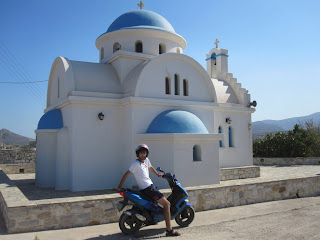
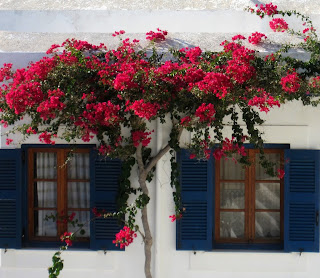
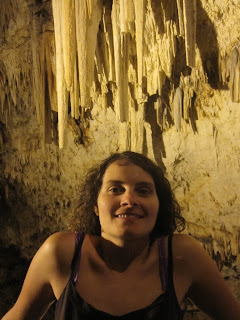

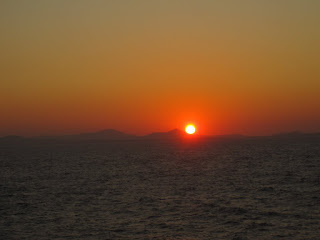


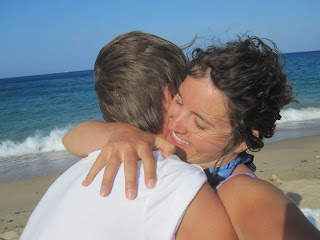

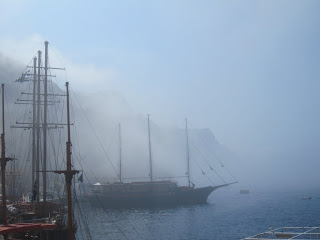

A very good report. Thank You.
ReplyDeleteYour analogy of the hotel touts fishing is very good, in fact their local name is Kamacki, which translates as Harpoon.
Cheers,
Thank you for your comment. As you can see my report is not very useful for people looking for holiday tips (restaurants, places to stay, etc), but covers more our personal experience. And getting a room on each island was definitely something exciting and good fun. I look forward to meeting the Kamacki again. :)
ReplyDelete